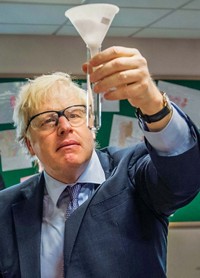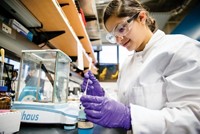Advertisement
Grab your lab coat. Let's get started
Welcome!
Welcome!
Create an account below to get 6 C&EN articles per month, receive newsletters and more - all free.
It seems this is your first time logging in online. Please enter the following information to continue.
As an ACS member you automatically get access to this site. All we need is few more details to create your reading experience.
Not you? Sign in with a different account.
Not you? Sign in with a different account.
ERROR 1
ERROR 1
ERROR 2
ERROR 2
ERROR 2
ERROR 2
ERROR 2
Password and Confirm password must match.
If you have an ACS member number, please enter it here so we can link this account to your membership. (optional)
ERROR 2
ACS values your privacy. By submitting your information, you are gaining access to C&EN and subscribing to our weekly newsletter. We use the information you provide to make your reading experience better, and we will never sell your data to third party members.
Research Funding
The UK government drops the Erasmus scheme in favor of the newly created Turing program
by Bibiana Campos-Seijo
January 10, 2021
| A version of this story appeared in
Volume 99, Issue 2
Dec. 31, 2020, marked the end of the transition period in the UK’s departure from the European Union. The country’s exit is disappointing for a variety of reasons, but one that I feel particularly sad about is that UK institutions will no longer participate in the Erasmus program.
Erasmus—which stands for European Region Action Scheme for the Mobility of University Students—is a student exchange program that was funded in 1987 by the European Commission. Since then, and throughout its iteration as Erasmus+, the program gave more than 7.3 million students from 4,000 higher education institutions in the EU the opportunity to study abroad.
I am disappointed because I was one of the beneficiaries of the program, which allowed me to leave my home country of Spain to go and live and study in the UK for 1 year. That year was a life-changing experience. I firmly believe that my participation in the Erasmus program fundamentally shaped many of my views and attitudes and made possible where I am today.
Under the terms of Brexit, the UK will no longer participate in the Erasmus scheme, and in its place the country has created another program, the Turing scheme. Of course, any program that fosters the mobility of budding scientists and others is better than none, but the substitution has disappointed many. For example, before Jan. 1, Erasmus students could study and work anywhere in Europe without needing to obtain a visa. Now European students entering the UK or those participating in the Turing scheme and traveling to Europe will be treated like any other person coming from outside the EU. In addition, Erasmus was predicated on institutions across Europe arranging two-way exchanges, which in many cases resulted in the establishment of long-term, broad relationships that involved, for example, joint research projects or the opportunity for teachers and educators to train or teach abroad. These opportunities are likely gone for the UK, as the Turing scheme operates only one way—sending students outside the country.
Globally, the UK is the number 2 destination for international students, right after the US, according to the New York Times. And within the EU, the UK was one of the preferred destinations, given many students’ desire to learn the English language. In fact, the UK had been receiving on average twice the number of students (more than 30,000 in 2019) than it sent to the Continent. These students represented an important revenue stream for the receiving UK institutions.
On a positive note, under the Turing scheme, just as with Erasmus, the UK government has promised to provide funding for around 35,000 students in the UK to study overseas, beginning in September 2021. In addition, it has pledged additional funds to cover, for example, the cost of passports and visas for disadvantaged students or preparatory visits for disabled students so they can ensure institutions make appropriate accommodations.
The UK government has described the Turing scheme as broader than Erasmus in outlook and globally significant, affording opportunities for students to study in countries beyond the 27 in the EU. Despite this added benefit, I’m with the many that are mourning the demise of the Erasmus program in the UK. This ambitious, visionary program fostering free movement of talent and intellectual capital across borders is unique. By proposing a monodirectional scheme and prioritizing cost versus the value it brings (which in my view is incalculable), we do our young people a disservice.
Views expressed on this page are those of the author and not necessarily those of ACS.




Join the conversation
Contact the reporter
Submit a Letter to the Editor for publication
Engage with us on Twitter